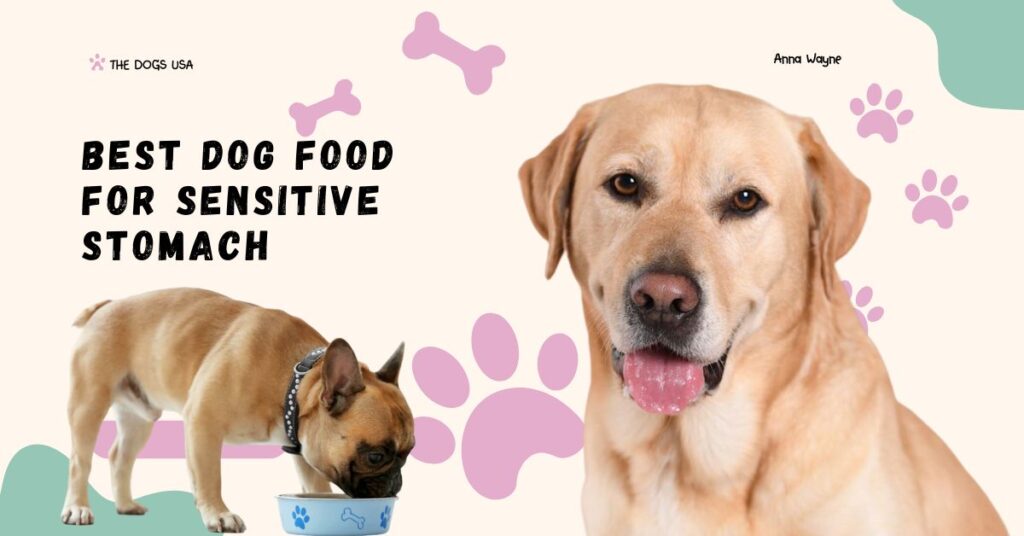Do you ever wonder why your furry companion gets uncomfortable after eating? Perhaps your dog periodically suffers from bouts of diarrhea, occasional vomiting, or just seems off after eating dinner. As the dog mom of three rescue pups (yes, three!) And, yes, I understand how heart-wrenching it is to watch your best friend in pain. So, here we are to discuss the best dog food for sensitive stomach and how to choose it, together with the things most dog owners don’t know about sensitive stomach in our canine friends.
Why Choosing the Right Dog Food Matters
When it comes to your pup’s happiness, hardly anything matters more than their belly. Happy tummy = happy/ playful tail-wagger! But digestive problems may be more prevalent than you realize.
The fact is, a lot of commercial dog foods are filled with fillers, artificial ingredients, and allergens that can upset your dog’s sensitive tummy. Choosing the best dog food for sensitive stomach can dramatically improve:
Your dog’s mood (yes, food affects behavior!)
Their energy levels
The quality of their coat
Less gas and cleaner poop (let’s be honest, we all notice it)
If your dog suffers from licking paws, scratching, or has inconsistent stools, you may need to consider trying hypoallergenic dog food or a grain-free dog diet.
Selecting the Best Dog Food for Sensitive Stomach
I understand — reading dog food labels can seem like translating a foreign language. So here’s a simplified step-by-step guide to help you choose the right food:
1. Look for Limited Ingredient Diets (LID)
These foods contain fewer ingredients, minimizing the risk of allergens. Think simple: one protein, one carb source.
2. Try Hypoallergenic Dog Food
The post-cleaning wipes are formulated for sensitive puppers. They frequently contain novel proteins like duck or salmon and eschew common irritants such as chicken or beef.
3. Try a Grain-Free Dog Food
Since your dog is also a member of the gym (aka your house), you may want to consider a grain-free dog diet.
In some dogs, wheat and corn can irritate sensitive stomachs. Trying a grain-free formula may help alleviate symptoms.
4. Look for Probiotics and Prebiotics
Probiotics help to support your dog’s healthy gut flora, and prebiotics help to feed the good bacteria. Both of which are essential for the digestive wellness of dogs.
5. Avoid Artificial Additives
If you can’t pronounce it, your dog probably shouldn’t eat it. Stick to natural, wholesome ingredients.
Expert Tips to Keep in Mind
As someone who’s been through the trial-and-error stage (with three different dogs!), Here are a few things I’ve learned:
Transition slowly. Sudden food changes can cause more upset. Mix old and new food over 7-10 days.
Track changes. Keep a food diary to monitor what works and what doesn’t.
Don’t forget water. Hydration plays a big role in digestion.
Talk to your vet. They can help identify allergies or underlying issues.
Most dog owners don’t know that even treats can mess with digestion. Always check those labels, too!
Local Favorites Across the USA
Dog owners from California to Texas to New York are raving about local brands that cater to sensitive stomachs. If you’re in Austin, check out Tomlinson’s for regional, high-quality options. In Portland, Natural Pet Food Solutions is a go-to.
Buying local often means fresher ingredients and fewer preservatives, which is great news for your pup’s tummy!
Also Read: Best Freeze-Dried Raw Dog Food
Frequently Asked Questions (FAQs)
Q1: What is the best dog food for sensitive stomach and diarrhea?
A: Look for LID or hypoallergenic formulas with probiotics. Pumpkin-based blends can also help firm up stools.
Q2: Can grain-free dog food really help with digestive issues?
A: Yes, for some dogs. A grain-free dog diet can reduce bloating, gas, and allergy symptoms.
Q3: How do I know if my dog needs sensitive stomach food?
A: Signs include vomiting, loose stools, gas, scratching, and licking paws. A vet visit helps confirm the cause.
Q4: Is chicken bad for dogs with sensitive stomachs?
A: Not always, but it’s a common allergen. Try novel proteins like duck, lamb, or fish if chicken seems problematic.
Q5: Can I make homemade food for my sensitive dog?
A: Yes, but consult your vet or a pet nutritionist to ensure it’s balanced. Many DIY meals lack essential nutrients.
Final Woofs: Bringing Comfort Back to Mealtime
Finding the best dog food for sensitive stomach might take a little patience, but trust me, your dog will thank you with every tail wag, happy bounce, and peaceful nap. You’re not just choosing food; you’re choosing better health and more joyful moments with your fur baby.
Have a favorite brand or your own story to share? Drop a comment below or visit more guides at TheDogsUSA.com – we love hearing from fellow dog lovers.
Written with love and paws by Anna Wayne, your go-to dog guide at The Dogs USA.


Pingback: Best Homemade Dog Food for Senior Dogs - ( June 2025)
Pingback: What Is the Best Dog Food for Dogs with Allergies? - The Dogs USA